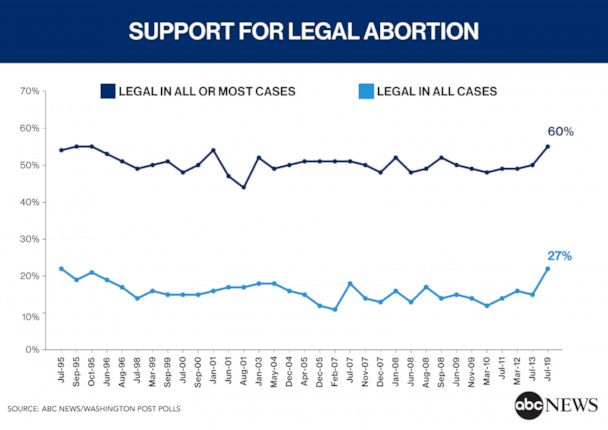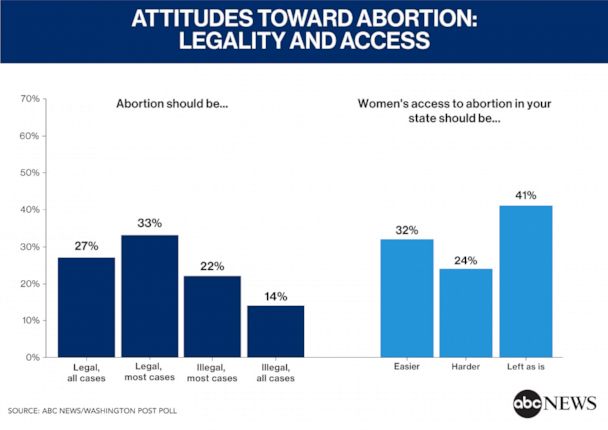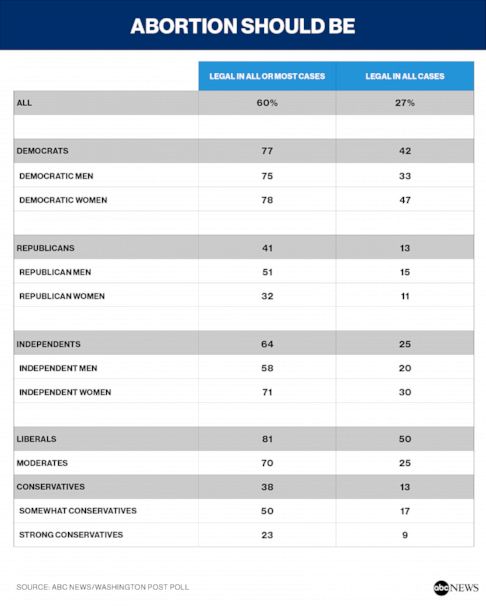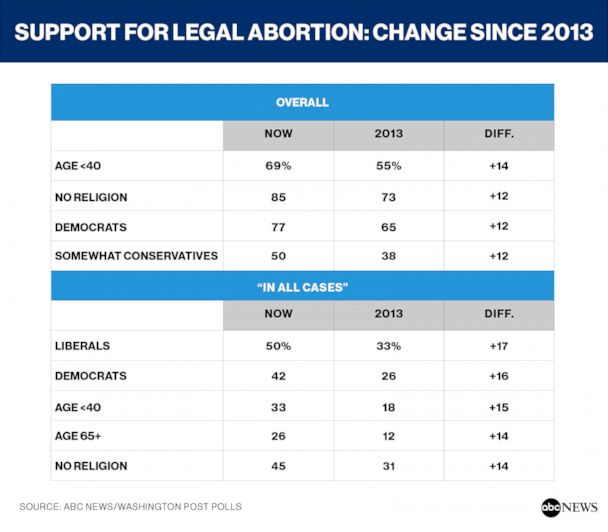Support for legal abortion matches its 24-year high: Poll
Sixty percent of Americans say abortion should be legal in all or most cases.
Sixty percent of Americans say abortion should be legal in all or most cases, the most in ABC News/Washington Post polls since 1995. More also say their state should make it easier, rather than harder, for women to have access to abortion, with a plurality favoring no change in the status quo.
Most of the change in support for legal abortion is among Americans who say it should be legal “in all cases,” now 27%, matching the high 24 years ago and up 11 percentage points from its low in early 2007. An additional 33% say it should be legal in most cases in this poll, produced for ABC by Langer Research Associates.

See PDF for full results, charts and tables.
The rest, 36%, say abortion should be illegal in all or most cases, down from 45% as recently as 2010 and a high of 48% in 2001. This includes 14% who say abortion should be illegal in all cases, about half as many as say it always should be legal.
While support for legal abortion now matches its high in fall 1995, trends since then have not been consistent. The long-term average, in 32 ABC/Post polls over this period, is 55%, compared with today’s 60%.
In terms of state-level action, 41% say laws on women’s access to abortion should be left as they are now. Thirty-two percent say access to abortion should be easier than it is now, for a total of 73% favoring either no change or fewer restrictions. Twenty-four percent say abortion access should be harder. (In an ABC/Post poll last summer, 30% said they would like to see the Supreme Court make it harder to get an abortion, down from 42% in 2005.)

At least 11 states have passed more restrictive abortion laws in recent months, of which six have been stayed by court orders. Six other states have moved in the opposite direction, enacting laws to ensure or expand abortion access.
Groups
Views on abortion access at the state level are similar among men and women. Essentially equal numbers also say abortion should be all or mostly legal overall, 62% of women and 59% of men. In one difference, women are 8 points more likely to say abortion should be legal in all cases, 31% vs. 23%.
Through a political lens, substantial majorities of Democrats (77%) and independents (64%) support legal abortion, compared with 41% of Republicans. It’s 81% among liberals and 70% among moderates, vs. 38% among conservatives. Support for legal abortion in all cases ranges from 56% of liberal women to 11% of conservative men.
Other differences between the sexes emerge within partisan groups. Republican men are much more likely than Republican women to favor legal abortion, 51% vs. 32%. The opposite is true among independents, with support higher among independent women than men, 71% vs. 58%. Among Democrats, men and women hold similar views on abortion being legal in all or most cases, but with women 14 points more likely to say it should be legal in all cases.
Religious beliefs also influence these attitudes. Among people with no religious preference – a quarter of all adults and the fastest-growing group in religious terms – 85% support legal abortion. So do 71% of non-evangelical Protestants, compared with 52% of Catholics and 37% of evangelical Protestants. Even among evangelical Protestants, relatively few say abortion should be illegal in all cases, 27%.
Among other groups, support for legal abortion peaks by age at 72% among 18- to 29-year-olds, and it’s 69% among all those younger than 40 compared with 55% among those 40 and older.

There are no significant differences overall by race and ethnicity. But in another political group of interest, college-educated white women are more apt to support legal abortion (72%) than college-educated white men and whites of either gender who lack a college degree (all with support in the mid- to high 50s). That said, college-educated white women are no more apt than other adults to favor making women’s access to abortion easier than it is now.
Thinking that states should make it easier for women to have access to abortion peaks among those with no religion (58%), liberals (57%), Democrats (50%) and 18- to 29-year-olds (46%). Thinking the opposite – that states should make abortion access harder – is highest, in turn, among strong conservatives (58%), evangelical Protestants (44%) and Republicans, (40%).
States with more restrictive abortion laws have more Republican populations than other states; that’s part of the reason that people in these states are 13 points more likely than those in less-restrictive states to say it should be harder for women to have access to abortion. Still, relatively few take this position, 29% in more-restrictive states vs. 16% in those with less restrictions. (More- and less-restrictive states were categorized using both the Guttmacher Institute’s State Abortion Policy Landscape and the Americans United for Life 2019 Life List.)
As reported in a previous analysis on Sunday, 61% of all adults call abortion a highly important issue in their vote for president in 2020, ranking it second to last on a list of nine items. There’s a big 27-point gender gap in this result, with abortion highly important to 73% of women compared with 46% of men. Indeed, 21% of women call it one of the single most important issues in their vote; just 6% of men say the same.
Attitudes on legal abortion are essentially the same among people who call it highly important in their vote as among those who don’t; six in 10 in both groups say it should be legal in all or most cases, including virtually identical shares of women who call it a top voting issue and of men who say the same.
Trend
Support for legal abortion in all or most cases is up a slight 5 points since last measured in an ABC/Post poll in 2013. That’s led by a 14-point rise among adults younger than 40 and 12-point increases in three groups – those with no religious preference, Democrats and people who call themselves “somewhat” conservative.
Thinking abortion should be legal in all cases, for its part, is up 7 points overall since 2013, including 17 points among liberals, 16 points among Democrats, 15 points among under-40s and 14 points both among those with no religion and those age 65 and older.

Methodology
This ABC News/Washington Post poll was conducted by landline and cellular telephone June 28-July 1, 2019, in English and Spanish, among a random national sample of 1,008 adults. Results have a margin of sampling error of 3.5 points, including the design effect. Partisan divisions are 29-23-37%, Democrats-Republicans-independents.
The survey was produced for ABC News by Langer Research Associates of New York, N.Y., with sampling and data collection by Abt Associates of Rockville, Md. See details on the survey’s methodology here.